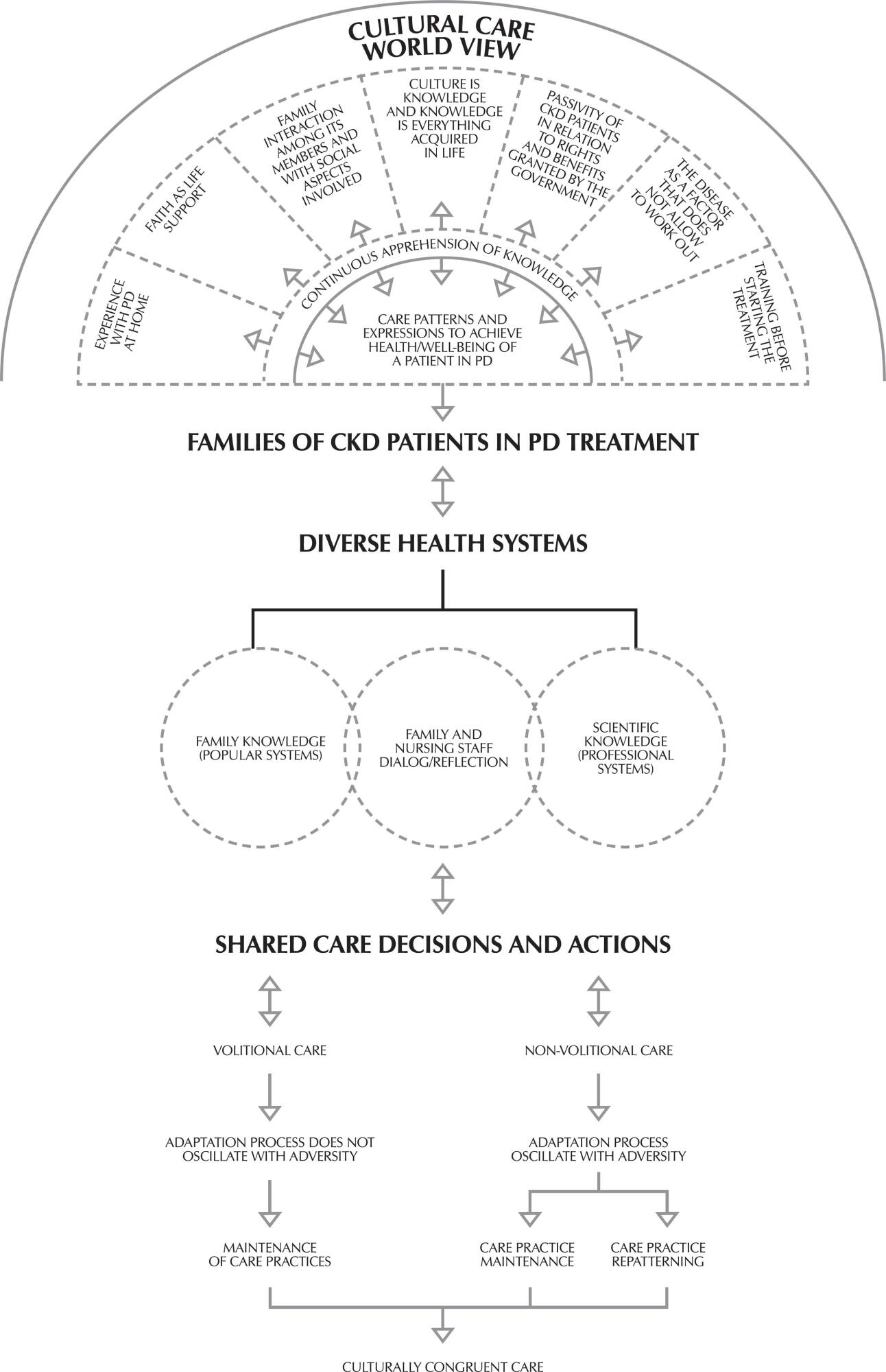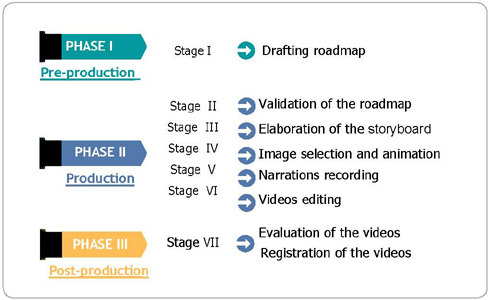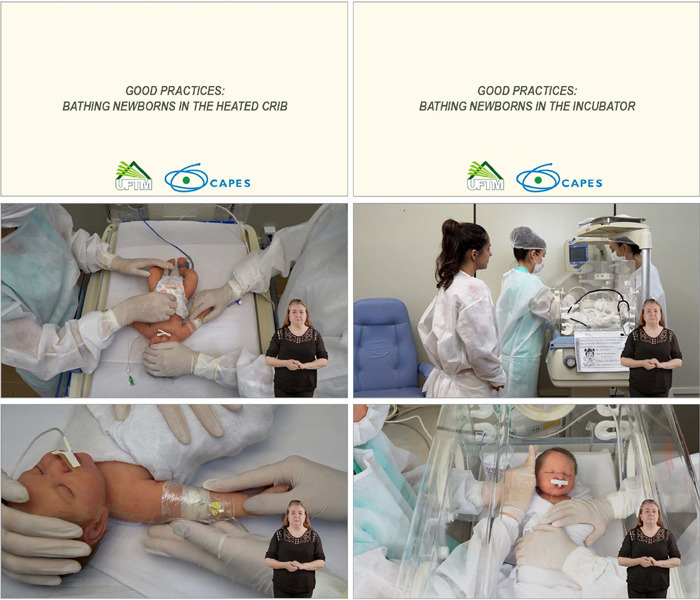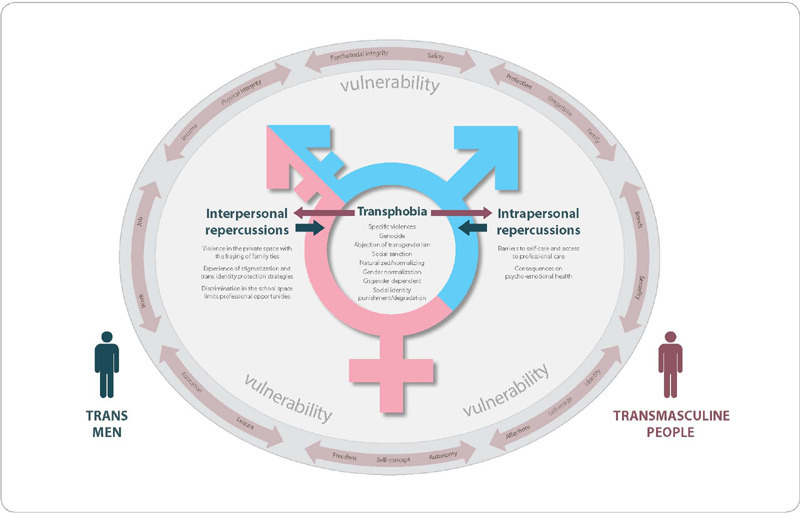-
ORIGINAL ARTICLE12-13-2024
Nurses’ experience regarding patient safety in mobile pre-hospital care
Revista Brasileira de Enfermagem. 2024;77(5):e20230529
Abstract
ORIGINAL ARTICLENurses’ experience regarding patient safety in mobile pre-hospital care
Revista Brasileira de Enfermagem. 2024;77(5):e20230529
DOI 10.1590/0034-7167-2023-0529
Views0See moreABSTRACT
Objectives:
to understand nurses’ experience regarding patient safety in mobile pre-hospital care.
Method:
a qualitative, exploratory and descriptive study, conducted with nurses active in mobile pre-hospital care services. Semi-structured interviews were conducted, audio-graved and submitted to Bardin’s content analysis.
Results:
from four thematic categories established, nurses reported the care and management skills necessary to work in this service. They demonstrated a commitment to ensuring safe care for patients, staff and spectators. They highlighted the actions taken to prevent and mitigate incidents. However, they based their experiences on practice protocols and individual actions, expressing the need to improve knowledge about patient safety.
Final Considerations:
mobile pre-hospital care nurses’ experience in relation to patient safety was limited, suggesting the need for training on the subject, alignment of work processes and implementation of strategies, aiming to guarantee safe care.
-
ORIGINAL ARTICLE12-13-2024
Repercussions of the pandemic on tuberculosis control actions from the perspective of health professionals
Revista Brasileira de Enfermagem. 2024;77(5):e20230477
Abstract
ORIGINAL ARTICLERepercussions of the pandemic on tuberculosis control actions from the perspective of health professionals
Revista Brasileira de Enfermagem. 2024;77(5):e20230477
DOI 10.1590/0034-7167-2023-0477
Views0See moreABSTRACT
Objectives:
to analyze the repercussions of the COVID-19 pandemic on tuberculosis control actions from the perspective of primary health care professionals.
Methods:
this descriptive study with a qualitative approach was conducted from November 2022 to April 2023, using semi-structured interviews with 11 key informant professionals from primary health care units in a Brazilian capital. Data were organized using Atlas.ti 22.0 software and subjected to thematic-categorical content analysis.
Results:
the pandemic scenario caused alterations in the work process, necessitating abrupt adaptations, and led to detrimental impacts on the health of professionals and tuberculosis control actions, which were reduced or discontinued.
Final Considerations:
there was evident unpreparedness and a lack of resources from various governmental levels and health services to handle the public health emergency situation without severe harm to the provision of essential services.
-
Training of Brazilian indigenous nurses: between human rights, valuing diversity and inclusion
Revista Brasileira de Enfermagem. 2024;77(5):e20230430
Abstract
Training of Brazilian indigenous nurses: between human rights, valuing diversity and inclusion
Revista Brasileira de Enfermagem. 2024;77(5):e20230430
DOI 10.1590/0034-7167-2023-0430
Views0See moreABSTRACT
Objectives:
to analyze the possibilities and potential of training indigenous nurses, given the Brazilian Health System (SUS), understanding the relationships between education and health.
Methods:
theoretical-reflective study, based on scientific literature, aligned with the experience, critical thinking of its authors and the Sustainable Development Goals in Brazil.
Results:
this text articulates three axes: Potential for including indigenous students in nursing training; Paths to achieving equity through inclusion and retention policies for indigenous students at different levels; and Implications of this for the SUS and global health.
Final Considerations:
indigenous students, beneficiaries of affirmative actions, face challenges of inclusion and retention in public universities that directly impact their academic training. Added to this are the difficulties identified in basic education, professor training and implementation of permanence policies, with consequences for services and training at other levels.
-
ORIGINAL ARTICLE12-13-2024
Interobserver agreement in Reception and Risk Stratification in Obstetrics implementation
Revista Brasileira de Enfermagem. 2024;77(5):e20230361
Abstract
ORIGINAL ARTICLEInterobserver agreement in Reception and Risk Stratification in Obstetrics implementation
Revista Brasileira de Enfermagem. 2024;77(5):e20230361
DOI 10.1590/0034-7167-2023-0361
Views0See moreABSTRACT
Objectives:
to analyze interobserver agreement in the Reception and Risk Stratification in Obstetrics protocol implementation.
Methods:
a cross-sectional study carried out during Reception and Risk Stratification in Obstetrics implementation, conducted in a tertiary hospital in southern Brazil with 891 participants in January 2020. Descriptive and interobserver agreement analysis was carried out using the Kappa coefficient in the risk stratification assigned by the triage nurse and reviewed by the researcher.
Results:
around half of the calls (55.6%) were stratified as not very urgent (green), followed by urgent (yellow) (31.8%), very urgent (orange) (9.3%), not urgent (blue) (3.4%) and no emerging stratification (red). Agreement analysis of revised stratification found Kappa values of 0.20 (blue), 0.54 (green), 0.77 (yellow) and 0.80 (orange).
Conclusions:
most appointments were non-urgent. The agreement analysis between the revised and assigned risk stratification revealed greater interobserver agreement as the priority level increased.
-
ORIGINAL ARTICLE12-13-2024
Adaptation and implementation of a Nursing care protocol for children in the Amazon Region
Revista Brasileira de Enfermagem. 2024;77(5):e20230245
Abstract
ORIGINAL ARTICLEAdaptation and implementation of a Nursing care protocol for children in the Amazon Region
Revista Brasileira de Enfermagem. 2024;77(5):e20230245
DOI 10.1590/0034-7167-2023-0245
Views0See moreABSTRACT
Objectives:
to describe the process of implementing an adapted protocol for pediatric nursing care in a health unit located in a municipality in the Amazon Region.
Methods:
methodological research conducted in a basic health unit with four family health teams in the state of Rondônia, involving seven nursing professionals. Data collection occurred between October 2020 and April 2022, following the research phases: situational diagnosis, exploratory phase, protocol definition, implementation, and evaluation.
Results:
the outcome was the adaptation and implementation of a nursing care protocol for children.
Final Considerations:
the adaptation and implementation process can be an effective approach to improving care, strengthening nursing as a profession with a solid foundation in scientific and clinical evidence. This facilitates early problem identification and appropriate guidance, leading to better health outcomes for children.
-
ORIGINAL ARTICLE12-13-2024
Nurses’ experiences in caring for people with mental health problems hospitalized due to clinical comorbidities
Revista Brasileira de Enfermagem. 2024;77(5):e20230136
Abstract
ORIGINAL ARTICLENurses’ experiences in caring for people with mental health problems hospitalized due to clinical comorbidities
Revista Brasileira de Enfermagem. 2024;77(5):e20230136
DOI 10.1590/0034-7167-2023-0136
Views0See moreABSTRACT
Objectives:
to understand nurses’ experiences in caring for people with mental health problems hospitalized due to clinical comorbidities in non-psychiatric Inpatient Units.
Methods:
qualitative study, guided by Alfred Schutz’s social phenomenology. Sixteen phenomenological interviews were conducted. The content was analyzed and discussed based on the literature, through the composition of three categories of analysis.
Results:
three categories emerged in the study: Challenges in care faced by nurses; Fragmented care action; and Ideal care. The disarticulation of the clinic was revealed, as described by nurses, showing care as an action far removed from the comprehensiveness of a person. Nurses’ performance is guided predominantly by biomedical reference, disregarding appreciation of subjectivity.
Final Considerations:
it was observed that nurses attribute the responsibility for patient care to factors external to their life-world, when, in fact, these aspects should be components that help them in comprehensive care construction.
-
REVIEW11-29-2024
Assessment of knowledge in oncology about care for transgender people: a scoping review
Revista Brasileira de Enfermagem. 2024;77:e20230532
Abstract
REVIEWAssessment of knowledge in oncology about care for transgender people: a scoping review
Revista Brasileira de Enfermagem. 2024;77:e20230532
DOI 10.1590/0034-7167-2023-0532
Views0ABSTRACT
Objective:
to identify evidence available in the literature on instruments and methodologies used to assess healthcare professionals’ knowledge about cancer care for the transgender population.
Methods:
a scoping review was conducted in seven databases, including studies that answered the question: what is the healthcare professionals’ level of knowledge about cancer care for the transgender population?
Results:
forty-one articles were selected that dealt specifically with healthcare professionals’knowledge in relation to care for the LGBTQIAPN+ population, especially the transgender population. Eighteen studies assessed patients’ perceptions of professionals’knowledge, whereas other studies used their own assessment tools, considering the global context of LGBTQIAPN+ health.
Conclusions:
there is no tested and validated instrument that assesses the knowledge about the transgender population’s oncological health, highlighting the need to construct and validate an instrument focused on this population’s needs.
Keywords:Health Services for Transgender PeopleNeoplasmsOncologyProfessional TrainingTransgender PeopleSee more
-
Peritoneal dialysis: family care for chronic kidney disease patients in home-based treatment
Revista Brasileira de Enfermagem. 2016;69(6):1172-1178
Abstract
Peritoneal dialysis: family care for chronic kidney disease patients in home-based treatment
Revista Brasileira de Enfermagem. 2016;69(6):1172-1178
DOI 10.1590/0034-7167-2016-0262
Views0See moreABSTRACT
Objective:
to propose a family care model for patients with chronic kidney disease in peritoneal dialysis based on evidence indicated by family members.
Method:
this was a qualitative descriptive study that used the Convergent Care Research method. It was conducted at a state hospital in Rio de Janeiro, including techniques for recording individual interviews and consisted of a group of 19 study participants. Data were analyzed according to the stages proposed by the method, generating a category that used a cultural question as the basis for patient care resulting in a proposal for home-based family care.
Results:
the patient care model proposed includes dialogue and reflection in sharing the knowledge of “professional” and “popular” systems, aiming to improve the patient’s quality of life.
Conclusion:
family members were able to promote care based on cultural preservation, accommodation and repatterning, as proposed by Leininger’s Sunrise Model.

-
Technology for self-care for ostomized women’s sexual and reproductive health
Revista Brasileira de Enfermagem. 2016;69(6):1164-1171
Abstract
Technology for self-care for ostomized women’s sexual and reproductive health
Revista Brasileira de Enfermagem. 2016;69(6):1164-1171
DOI 10.1590/0034-7167-2016-0302
Views0See moreABSTRACT
Objective:
to validate the technology of printed booklets on self-care for ostomized women’s sexual and reproductive health.
Method:
a methodological study was performed with a focus on the construction and validity of a printed booklet. The content of this booklet was validated by 11 specialist judges/nurses, according to a Content Validity Index (CVI) equal to or higher than 0.80. Appearance was validated by nine ostomized women, according to an assessment of the difficulty and convenience of the educational material.
Results:
the booklet was validated by specialists, with an overall mean CVI equal to 0.87. Moreover, the target population showed 100% of agreement in terms of the adequacy of organization, writing style, appearance and motivation of this booklet.
Conclusion:
the educational technology in question was validated according to content and appearance, thus representing an adequate, reliable and easily understandable resource to acquire knowledge about self-care for ostomized women’s sexual and reproductive health.

-
Short-course therapy for tuberculosis: a discourse analysis
Revista Brasileira de Enfermagem. 2016;69(6):1154-1163
Abstract
Short-course therapy for tuberculosis: a discourse analysis
Revista Brasileira de Enfermagem. 2016;69(6):1154-1163
DOI 10.1590/0034-7167-2016-0330
Views0ABSTRACT
Objective:
to analyze the meanings produced by nursing professionals in the directly observed treatment (DOT) for tuberculosis (TB) in the city of São Paulo.
Method:
this is a qualitative study, conducted in March and April 2014 through semi-directed interviews with nine nurses. The empirical material produced was analyzed according to the theoretical and methodological support of the Discourse Analysis of French matrix.
Results:
results have emerged as three discursive blocks: conditions for the production of tuberculosis control practices; production conditions facilitating the treatment of tuberculosis; and production conditions hindering the treatment of tuberculosis.
Conclusion:
these professionals’ words produce different meanings, which suggest that the practices of nursing professionals allow the patient to search for a cure, which is reinforced by incentives of a social nature, but permeated by the vicissitudes that are circumscribed in the ill person’s everyday production conditions.
Keywords:Directly Observed TherapyMedication AdherenceNursing, TeamPublic Health PracticeTuberculosisSee more -
Representações cotidianas de jovens sobre a periferia
. ;
Abstract
Representações cotidianas de jovens sobre a periferia
. ;
Views0RESUMOObjetivos:compreender as representações cotidianas de jovens sobre a periferia, com a finalidade de compor os temas para programas midiáticos de educação sobre drogas.Método:abordagem marxista, com pesquisa-ação emancipatória e participação em oficinas de 13 jovens de uma escola pública da periferia de São Paulo.Resultados:entre os jovens há representações cotidianas contraditórias sobre o papel do Estado, que, […]See more -
Aids in the elderly: reasons that lead to late diagnosis
Revista Brasileira de Enfermagem. 2016;69(6):1140-1146
Abstract
Aids in the elderly: reasons that lead to late diagnosis
Revista Brasileira de Enfermagem. 2016;69(6):1140-1146
DOI 10.1590/0034-7167-2016-0370
Views0See moreABSTRACT
Objective:
to investigate elderly living with HIV/Aids and health professionals, what are the reasons that lead to late diagnosis of HIV infection in the elderly.
Method:
prospective, qualitative study, conducted at a specialized outpatient clinic with elderly living with HIV/Aids, diagnosed age over 60 years and in the Family Health Strategy units with nurses and physicians. Data were collected through interviews and verified by content analysis, using the theoretical framework of vulnerability.
Results:
a total of 11 elderly, 11 nurses and 12 physicians participated in the study. Three empirical categories emerged: the late diagnosis of HIV happens against the health service; invisibility of the sexuality of the elderly; and weaknesses in the anti-HIV serology request for the elderly.
Conclusion:
there are health professionals who see the elderly as asexual, causing the diagnosis of HIV to happen in the secondary and tertiary service instead of primary care.
-
Storytelling: a care technology in continuing education for active ageing
Revista Brasileira de Enfermagem. 2016;69(6):1132-1139
Abstract
Storytelling: a care technology in continuing education for active ageing
Revista Brasileira de Enfermagem. 2016;69(6):1132-1139
DOI 10.1590/0034-7167-2016-0390
Views0See moreABSTRACT
Objective:
assessing relevance and effectiveness of care/educational technology in the form of “storytelling” as a strategy in the cultivation of active ageing (AA) for elderly users of a Basic Health Unit (BHU), from the Amazon region.
Method:
convergent care research (CCR) held in a BHU in Belém, state of Pará, with eight elderly ladies for testing this technology. An active ageing assessment questionnaire and WHOQOL-BREF – quality of life assessment were applied. After training with a view to continuing education, elderly ladies told stories for an audience that addressed the question: “What did you learn from it for your life?”
Results:
tThe popular stories elicited reactions from which the following categories emerged: solidarity; respect for the other; imagination, dreams, hopes and culture of the Amazonian. This practice had a positive result, producing changes in the quality of life of the elderly, particularly in the psychological domain.
Conclusion:
“storytelling” proved to be an innovative technology, a relevant and effective resource in health education, especially for active ageing.

-
Nurse care practices in the Family Health Strategy
Revista Brasileira de Enfermagem. 2016;69(6):1124-1131
Abstract
Nurse care practices in the Family Health Strategy
Revista Brasileira de Enfermagem. 2016;69(6):1124-1131
DOI 10.1590/0034-7167-2016-0273
Views1See moreABSTRACT
Objective:
to analyze the practices of care of nurses working in teams of the family health strategy, from the perspective of users.
Method:
qualitative research conducted with 34 registered users in seven family health units of a municipality of Bahia from June to December 2014. The results were organized by the technique of content analysis.
Results:
users showed satisfaction with the nurse care due to listening, warmth and resolution of their health needs, despite the emphasis on procedures and programs targeted to populational groups. The dissatisfaction stems from the authoritarian, prescriptive and inflexible attitude in the nurse care. It was also emphasized that the home visits are directed to the bedridden and more restricted to preventive actions. Educational activities occur during the nursing consultation and in the health unit.
Conclusion:
there is urgent need of redefining the care as a structuring axis of the nurse practice.
-
Interdisciplinary care praxis in groups of people living with fibromyalgia
Revista Brasileira de Enfermagem. 2016;69(6):1115-1123
Abstract
Interdisciplinary care praxis in groups of people living with fibromyalgia
Revista Brasileira de Enfermagem. 2016;69(6):1115-1123
DOI 10.1590/0034-7167-2016-0279
Views0See moreABSTRACT
Objectives:
to analyze the integrated community therapy model for the empowerment of people living with fibromyalgia and discuss the impact of this interdisciplinary intervention in the health-disease process and self-care.
Method:
a participatory-approach qualitative study, developed in 2015 with 11 participants at the Laboratory of Physiology Applied to Physical Education of the Rio de Janeiro State University, RJ. Data production comprised World Café, participant observation and semi-structured interview. The analysis was performed according to Bardin, through data triangulation in dialogue with the relevant literature.
Results:
the integrated community therapy group is a driving force in building and expanding knowledge about fibromyalgia and in self-care empowerment.
Conclusion:
this group strategy proved to be an interdisciplinary praxis tool that enables the development of solidary care networks. Thus, shared knowledge was generated, transformed into a listening and reflection environment to manage personal and family obstacles.
-
Digital technology for the prevention of healthcare-related infections in critical care
Revista Brasileira de Enfermagem. 2023;76:e20220528
Abstract
Digital technology for the prevention of healthcare-related infections in critical care
Revista Brasileira de Enfermagem. 2023;76:e20220528
DOI 10.1590/0034-7167-2022-0528
Views0See moreABSTRACT
Objective:
To develop digital technology for patient and family integration into the Intensive Care Unit care team, aiming to subsidize decision-making for the prevention of infections related to healthcare.
Method:
Methodological research of technological production in three phases: pre-production, production, and post-production in a teaching hospital in southern Brazil. Sixteen intensive care unit nurses participated.
Results:
The research produced six videos: general guidelines on the Intensive Care Unit, Preventing infections: hand hygiene; Pneumonia associated with mechanical ventilation; Catheter-associated primary bloodstream infection; Catheter-related urinary tract infection.
Final considerations:
The proposed technology was developed and aims to assist nurses in bringing patients and families closer to the routines of the intensive care environment to provide safety in the contact of the patient of intensive care units with family members and in the active participation for the prevention of infections related to healthcare.

-
ORIGINAL ARTICLE11-13-2023
Development of educational videos about bathing in bed newborns admitted to a neonatal unit
Revista Brasileira de Enfermagem. 2023;76:e20220778
Abstract
ORIGINAL ARTICLEDevelopment of educational videos about bathing in bed newborns admitted to a neonatal unit
Revista Brasileira de Enfermagem. 2023;76:e20220778
DOI 10.1590/0034-7167-2022-0778
Views0See moreABSTRACT
Objective:
to develop and analyze evidence of content validity of educational videos about bathing newborns in bed in a neonatal unit.
Method:
applied and methodological research, carried out from December/2020 to February/2022, in three phases: pre-production, production, post-production. Validity was carried out by nurses specializing in social communication and nursing professionals, including the Brazilian Sign Language and assessment by nursing students. The Content Validity Index and Cronbach’s alpha above 0.8 were considered for analysis.
Results:
the videos were entitled “Best practices: bathing newborns in the heated crib” and “Best practices: bathing newborns in the incubator”, lasting seven minutes each, divided into six scenes that demonstrated the approach to parents, environment and material organization, preparing newborns, bathing and after-bath care.
Conclusion:
the videos will support permanent education processes, academic training and professional training in nursing.

-
ORIGINAL ARTICLE11-13-2023
Vulnerability to physical inactivity: evidence of content validity and response processes
Revista Brasileira de Enfermagem. 2023;76:e20220563
Abstract
ORIGINAL ARTICLEVulnerability to physical inactivity: evidence of content validity and response processes
Revista Brasileira de Enfermagem. 2023;76:e20220563
DOI 10.1590/0034-7167-2022-0563
Views0See moreABSTRACT
Objective:
To analyze content validity evidence and response processes of a bank of items for measuring vulnerability to physical inactivity in adults.
Method:
Methodological study, with 13 specialists and 46 representatives of the target population. The Content Validity Index (CVI) and binomial test were calculated; data obtained through validity based on response processes were collected through interviews.
Results:
Of the 105 constructed items, 16 were excluded (CVI<0.78); 89 items showed agreement <80% in the psychometric criteria, being modified. Of the 101 items that remained (CVI>0.78), 34 were changed and 4 were deleted after evaluating the evidence of response processes. In the end, 97 items remained, with a global CVI of 0.92, organized into two dimensions: Subject (CVI=0.91) and Social (CVI=0.94).
Conclusion:
The items presented adequate parameters and evidence of validity; and can subsidize the construction of instruments that consider the subject’s and social vulnerability in understanding physical inactivity.
-
ORIGINAL ARTICLE11-13-2023
Transphobia as a social disease: discourses of vulnerabilities in trans men and transmasculine people
Revista Brasileira de Enfermagem. 2023;76:e20220183
Abstract
ORIGINAL ARTICLETransphobia as a social disease: discourses of vulnerabilities in trans men and transmasculine people
Revista Brasileira de Enfermagem. 2023;76:e20220183
DOI 10.1590/0034-7167-2022-0183
Views0See moreABSTRACT
Objective:
to analyze the repercussions of transphobia on trans men’s and transmasculine people’s health.
Method:
a qualitative study carried out with 38 participants, 35 trans men and three trans men, who attended specialized transgender health services in Bahia, Brazil. In-depth interviews were carried out between June 2019 and February 2020. The Discourse of Collective Subject technique was used and interpretation based on the theoretical concept of transphobia.
Results:
transphobia has intra and interpersonal repercussions on the life and health of trans men and transmasculine people who attend health services. There were experiences of violence in the private space, fraying of family ties; discrimination in the school space; limitation in professional/work opportunities; barriers to self-care and access to health services; elaboration of trans identity protection strategies; consequences of transphobia on psycho-emotional health.
Conclusion:
transphobia is a social disease that affects different life and health dimensions. It causes damage to the socialization of trans men and transmasculine people, in addition to health service spaces as well as in family environments, schools, universities and at work, which result in non-adherence to self-care, distancing from health services and psycho-emotional distress.

-
ORIGINAL ARTICLE11-10-2023
Validation of the Advanced Practice Nursing Competency Assessment Instrument in a hospital environment
Revista Brasileira de Enfermagem. 2023;76:e20220705
Abstract
ORIGINAL ARTICLEValidation of the Advanced Practice Nursing Competency Assessment Instrument in a hospital environment
Revista Brasileira de Enfermagem. 2023;76:e20220705
DOI 10.1590/0034-7167-2022-0705
Views0See moreABSTRACT
Objectives:
to evaluate the measurement properties of the Advanced Practice Nursing Competency Assessment Instrument – Brazilian version, in the hospital environment.
Methods:
a methodological study conducted in a hospital with 238 nurses. Three instruments collect the data: sample characterization form, Brazilian version of the Advanced Practice Nursing Competency Assessment Instrument, and the category “therapeutic interventions” of the nurse competence scale. Construct validity was verified by confirmatory factor analysis and Spearman’s correlation coefficient, and reliability by Cronbach’s Alpha and composite reliability.
Results:
in the factor analysis, the model converged to a satisfactory result. The study found acceptable evidence of reliability (Cronbach’s Alpha, 0.76-0.87; and composite reliability, 0.85-0.90).
Conclusions:
the instrument demonstrated evidence of construct validity and internal consistency and can be used in practice
-
HeLP: Development of occupational protection mask against surgical smoke
Revista Brasileira de Enfermagem. 2023;76:e20220647
Abstract
HeLP: Development of occupational protection mask against surgical smoke
Revista Brasileira de Enfermagem. 2023;76:e20220647
DOI 10.1590/0034-7167-2022-0647
Views0ABSTRACT
Objectives:
to describe a technological innovation in the development of an individual, ergonomic, sustainable and effective occupational respiratory protection mask for workers exposed to surgical smoke.
Methods:
applied, exploratory, quantitative research, using design methods and tools: Sense Intent, Know Context, Know People, Frame Insights, Explore Concepts, Frame Solutions, Realize Offerings, in addition to the Product Development Process tools. It was developed from March 2019 to December 2021.
Results:
from the prototyping mold, it became possible to represent the abstract to the physical, where all the concepts created in the methodological steps were implemented and the necessary adjustments were made to create the model as a technological innovation, which will have the concept for product commercialization.
Conclusions:
a mask for protection against surgical smoke (HeLP) was developed, from the design step to the prototype development, being a technological innovation.
Keywords:Air Pollutants, OccupationalPersonal Protective EquipmentRespiratory Protective DevicesSmokeTechnological Development and Innovation ProjectsSee more
-
Technology for the treatment promotion of adults living with HIV: Positive o Cuidado (Positive the Care)
Revista Brasileira de Enfermagem. 2023;76:e20220454
Abstract
Technology for the treatment promotion of adults living with HIV: Positive o Cuidado (Positive the Care)
Revista Brasileira de Enfermagem. 2023;76:e20220454
DOI 10.1590/0034-7167-2022-0454
Views0See moreABSTRACT
Objectives:
to develop a responsive website focused on treatment adherence for adult users living with HIV.
Methods:
technological study conducted between August and October 2020, in the light of Pierre Lévy’s theoretical-philosophical framework, using the Double Diamond Process methodology associated with the five stages of The Elements of User Experience framework.
Results:
it was developed the responsive website Positive Care (Positive o Cuidado), composed of an initial presentation screen and 13 other screens named: Family Health and You; Undetectable = Untransmissible; Antiretroviral Drugs; Routine Tests; Vaccination; Antiretroviral Delivery; Drug Interactions; Combined Prevention; Support Services; Healthy Life; Family and Reproductive Planning; Covid 19; and Questions, Curiosities, and Myths.
Final Considerations:
the responsive website was developed based on the software design and programming process and has requirements/functionalities with the potential to strengthen the collective intelligence about HIV and, consequently, to promote treatment adherence by its users.

Search
Search in:
Nuvem de Tags
Aged (144) Atenção Primária à Saúde (239) COVID-19 (104) Cuidados de Enfermagem (269) Educação em Enfermagem (151) Educação em Saúde (139) Enfermagem (930) Estudos de Validação (131) Health Education (144) Idoso (208) Mental Health (149) Nursing (987) Nursing Care (306) Patient Safety (151) Primary Health Care (284) Qualidade de Vida (104) Quality of Life (106) Saúde Mental (145) Segurança do Paciente (150) Validation Studies (108)



